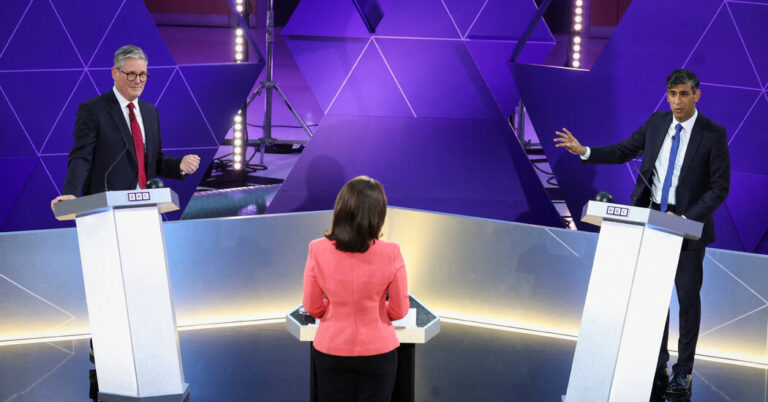Forty-eight hours before President Biden and former President Donald J. Trump faced off on stage in Atlanta on Thursday, the leaders of Britain’s two major parties, Prime Minister Rishi Sunak and Keir Starmer, faced off in Nottingham , in England.
To say that their debates were different does not begin to convey the Atlantic-sized gulf between them.
In content, tone and atmosphere, the British debate featured two politicians in their prime, clashing over issues — often heated, not without personal attacks, but focused on the political nuances of taxation, immigration and health care. Neither Mr. Sunak, 44, nor Mr. Starmer, 61, mentioned his golf handicap.
Britain and the United States are often seen as operating in the same political climate system: the conservative turn to Margaret Thatcher and Ronald Reagan, the pivot to youth and the center left with Bill Clinton and Tony Blair, and the anti-establishment populist party. the backlash that fueled Brexit and Mr. Trump. But this week’s back-to-back meetings showed how far these democracies have diverged, at least during this election cycle.
“These are two countries in very different places, with very different visions of their place in the world,” said Kim Darroch, who served as Britain’s ambassador to Washington during the Trump administration.
“The tone between Sunak and Starmer was that of two deeply serious politicians,” Mr Darroch continued. “Between Biden and Trump, it was bitter, it was mean, it was childish, but it wasn’t serious. »
To some extent, this reflects the different nature of the candidates: Mr Sunak, a former hedge fund manager, and Mr Starmer, a former prosecutor, are more technocratic and detail-oriented figures than Mr Trump or Mr Biden. Neither is known for being a charismatic politician.
Nor do they have the personal animosity between Mr Trump, 78, and Mr Biden, 81. Both entered parliament in 2015 and barely knew each other until Mr Sunak became prime minister in 2022.
But this change in tone also reflects the way in which British politics has moved beyond the toxic divisions linked to Brexit. Eight years after Britons voted to leave the European Union, they have returned to more ordinary debates about taxes, spending, planning permission for housing and how to reduce waiting times in an overburdened public health system.
“Sunak tried early in the campaign to introduce some American-style culture war issues into the debate, but there was no appetite for that,” said Robert Ford, a professor of political science at the University from Manchester.
There has also been a shift in political personality in the UK. “Who was missing from the political scene? Boris Johnson,” said Professor Ford, referring to the flamboyant prime minister who led the Brexit campaign and has been compared to Mr Trump.
Mr Johnson was ousted by his Conservative Party after scandals including social gatherings held during pandemic lockdowns. His successor, Liz Truss, lasted just 44 days after her tax cut proposals sparked a backlash in financial markets.
“Our system seems to have healthier formal and informal mechanisms for getting rid of leaders,” Ford said. “With Biden and Trump, there’s no obvious mechanism for getting rid of them,” other than defeating them on Election Day.
When voters go to the polls in Britain on July 4, they are expected to oust Mr Sunak’s centre-right Conservative Party after 14 years in power, in favour of Mr Starmer’s centre-left Labour Party. The debate has been seen as one of Mr Sunak’s last chances to avoid a landslide defeat.
The prime minister insisted that Labour would raise taxes and open Britain’s borders to immigrants. “Don’t capitulate,” Mr Sunak repeatedly told the studio audience (another difference from the debate in the US, where there was no studio audience).
The closest thing Mr Biden and Mr Trump came to trading blows was the furious response from Mr Starmer, who accused the Prime Minister of lying about taxes. Otherwise, he seriously outlined the party’s plans to build 1.5 million new homes, calling the lack of affordable housing “the tragedy of the last ten years”.
There was widespread criticism of the debate. Some accused Mr Sunak of being overly aggressive and bullying Mr Starmer. Others said Mr Starmer was unstable, particularly over how he would try to stem the flow of asylum seekers crossing the Channel.
Discussions about taxes seemed tedious to some. Writer Jonathan Coe compared it unfavorably to European Football Championship matches, broadcast at the same time on another channel.
“Can I stand to spend another hour watching these people uselessly kick a ball around, or should I turn around and watch football instead?” Mr Coe posted on X.
Televised debates, Mr. Darroch noted, are a relatively recent American import into British politics; the first between candidates for prime minister took place in 2010. Unlike in the United States, where they can change the trajectory of a campaign – as many Democrats fear Mr Biden’s faltering performance will do – the Debates rarely change public opinion in Britain.
For one thing, British politicians debate each other almost every week in the House of Commons. Mr. Sunak and Mr. Starmer have faced off dozens of times during Prime Minister’s Questions, a Wednesday ritual in which the opposition leader questions the prime minister while reporters keep score.
“If you’re both good at debating, it gets very boring because no one makes huge gaffes,” Mr Darroch said. “The British public expects a cricket match, not too many low blows. We live in a greyer political world, compared to the Technicolor of debates in the US.”


